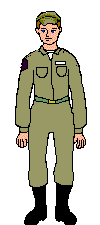Personal Interview
NON VERBAL COMMUNICATION CAN OFTEN MAKE OR MAR YOUR PERSONAL INTERVIEW IN THE SSB
NVC can often make or mar your in an interview. For ex: In an interview you may feel that you have excellently done it. Although you had perfected your verbal communication, the non verbal cues you sent out were negative and portrayed you as non-confident.
Posture – Stand and walk with your head erect and shoulders back, and keep your gait lively.
Facial expression – If the image you want to convey is of an upbeat, energetic, capable person, they you must have a pleasant expression of your face. A face that looks relaxed – no furrowed brow, tense jaw, nervous twitches, or stern expression – gives the interviewer the impression that you are not only a pleasant person to deal with, but a confident one, as well.
A person can express all types of feelings and emotions through facial expressions. He can express pleasure and sorrow, friendliness and acceptance of a point through his facial expressions. During the interview, therefore, he should use appropriate facial expressions to support his ideas.
You would be amazed at the number of people who while interviewing are totally unaware of the sullen, bewildered, or even mildly hysterical expression plastered on their faces. This is more often than not true for college students. Hence practice before a mirror or with a friend to see what makes you scrunch up your face and avoid thinking those negative thoughts. Happy and positive thoughts make for a positive outlook.
Eye Contact – An interviewer gets most of the information about a candidate by looking into his eyes. Expression in the candidate’s eyes gives him the most accurate information about him. A candidate who fails to make eye contact with the interviewer is not likely to be trusted by him.
Possibly, one of the most important non-verbal cues that can provide insights into your levels of confidence as also your levels of interest. If you have a habit of looking away, while listening, it shows lack of interest and a short attention span. If you fail to maintain eye contact while speaking at the least it betrays lack of confidence in what you are saying and at a maximum, it may send a subtle indication that you could be lying
Always make eye contact with IO. This not only communicates your interest, it powerfully conveys your trust and your trustworthiness. On the other hand, if you fail to make eye contact, if you deliberately look away, or if your eyes habitually wander, you suggest two things: (1) You are bored with the IO (2) you are hiding something. You are dishonest – shifty eyed


